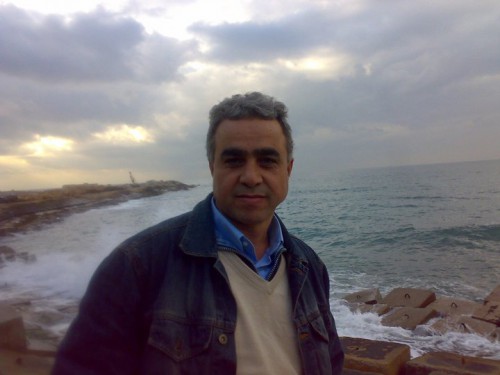Defamation of Religions is Haunting Egypt’s Writers
by Hamdy El-Gazzar and translated by Amani Elmawed / October 7, 2013 / 1 Comment
Karam Saber is sentenced to five years in prison for his short story collection Where is God?

On October 22, Karam Saber will appeal his five year sentence. Photo via Facebook.
The ongoing revolution in Egypt is still about freedom of religion, freedom of opinion, freedom of expression, creativity, and human rights. Generally these are far-fetched dreams. As it stands, many people oppose, by words and deeds, both these freedoms and global standards of human rights. In addition, the individuals protesting such freedoms are not only followers of dark, religious parties, they also exist in the midst of the Egyptian public as influential people with powerful political forces.

- “From Egypt” attempts to draw a cultural map of Egypt and the Arab world by profiling the artistic, literary, and political issues that affect the region via on-the-ground coverage of current events, publications, and the fight for freedom of expression.

- Hamdy El-Gazzar is an Egyptian writer and one of the 39 young Arab writers included in the Beirut 39 Project. His first novel, Sihr Aswad (Dar Merit, 2005) won the prestigious Sawaris Award, and was subsequently translated by Humphrey Davies (Black Magic, AUC Press, 2007). His second novel, Ladhdhat Sirriyya (Secret Pleasures) was published by Dar al-Dar in 2008. He is currently working on a third novel.
Over the last century, Egyptian intellectuals, writers, and innovators have known many forms of abuse. They have been accused of heresy and religious defamation, and appeared in front of judges who were neither interested in intellect nor creativity. They have known a type of jurisprudence that differentiates between the husband and his wife (the thinker Nasr Hamed Abu Zeid, for example), and have seen an assassination attempt committed against Nobel laureate Naguib Mahfouz, who was attacked by an illiterate man claiming Mahfouz’s novel Children of Gebelawi was blasphemous. They have also witnessed the death of the thinker Farag Foda at the hands of terrorists.
Last May, the harshest judgment issued for a writer in the last twenty years was pinned upon the peasants’ rights activist Karam Saber and his short story collection Where is God. Initially charged with religious defamation on the basis of Hisbah reports from some public Muhtasibs, Saber was sentenced to five years in prison in absentia.
However, on October 22 Saber will appear before the court of misdemeanors in Biba, Beni Suef province, to appeal the sentence issued against him in May 2013. The appeal also calls for the imprisonment of the judge who originally sentenced him.
The case began in December, 2011 as a complaint from Mr. Ahmed Abdel Tawab Hashem, and others, including the Chancellor General Attorney for the Prosecution of Beni Suef. They targeted Saber for his book Where is God, which deals with the existence of God in the everyday lives of peasants. In addition, the accusation included the way the writer formulated, published, and distributed the book to some people in Rashwan Izba, which is at the center of Biba in Beni Suef. They claimed that the book is an invitation to blasphemy and atheism, an incitement to polytheism, an offense of the divine, and a defamation of religion. They dictated their complaints to an affiliate of the Beni Suef orthodox church and an administrative official of research, writing, and translation at Al-Azhar. Their expert team denounced some of the words in the book and took passages out of context. Ultimately they declared it a violation, brazen and ridiculing. Luckily neither is a specialist in declaring the Fatwa!
Forty six Egyptian and Arabic human rights organizations have asked the judge to drop the charges against Saber. In a statement on September, 9, 2013 about the behavior of the prosecution, and how they tried to obtain reports from the church and Al-Azhar in order to condemn the writer, despite the fact that religious institutions have no right to express their opinion on any literary or creative work, since it is out of their specialty. Moreover, the religious authority is not considered to be ready or qualified to judge creative work, which should be done by literary critics and the audience, who has the right to read or ignore it.
By October 22, the destiny of the writer and the future of the freedom of creativity will be determined in Egypt!





One Comment on "Defamation of Religions is Haunting Egypt’s Writers"
Trackbacks for this post